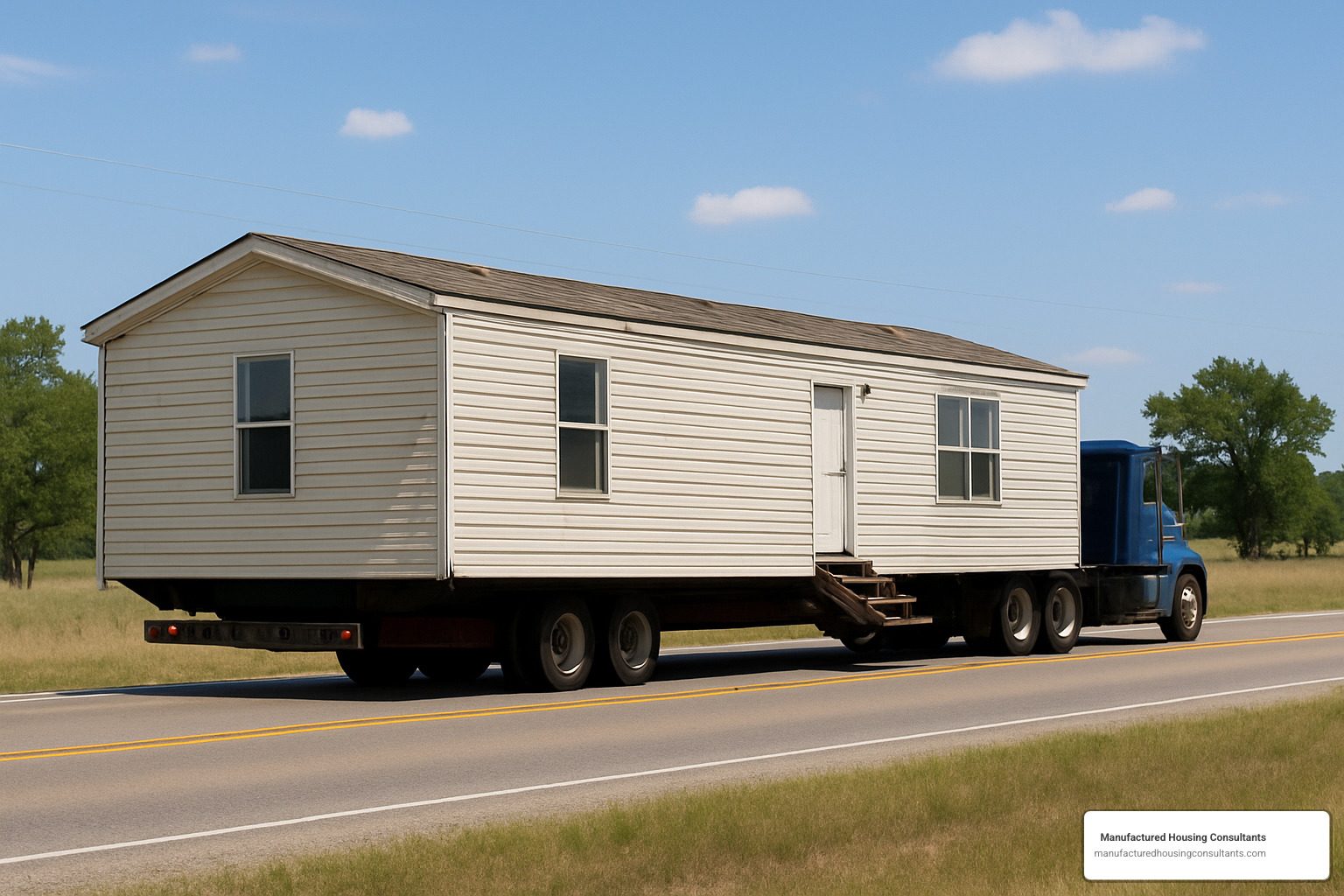Finding Affordable Housing on the Move: The Mobile Home Advantage
If you’re looking for a used mobile home for sale to be moved, here’s what you need to know:
- Average Cost Range: $25,000-$35,000 for 3-bedroom, 2-bathroom models in Texas
- Financing Options: Up to 100% loan-to-value available with no age restrictions
- Timeline: 4-6 weeks for home-only loan closing, plus 1-3 days for physical moving
- Required Documents: Title transfer, transport permits, and site preparation approval
- Key Inspection Points: Frame condition, roof integrity, floor stability, and HUD data plate
Used mobile home for sale to be moved refers to pre-owned manufactured housing that can be purchased and transported to a new location. These homes offer an affordable housing solution with the flexibility of placement on private land or in mobile home communities.
The market for relocatable manufactured homes is particularly strong in Texas, where single-wide models (700-1,200 square feet) start around $25,000 and double-wides (1,300-1,800+ square feet) are often available between $25,000-$35,000.
Unlike traditional real estate, these homes can follow you to new locations when life circumstances change. This mobility factor creates unique opportunities for budget-conscious buyers who already own land or have secured a spot in a mobile home park.
Mobile homes experience their steepest depreciation in the first few years—similar to cars—making used models significantly more affordable than new ones. When properly maintained and placed in appreciating neighborhoods, they can hold or even increase their value over time.
For families seeking affordable housing with quick move-in timelines, used mobile homes that can be relocated offer a practical solution without the months-long wait associated with new construction.
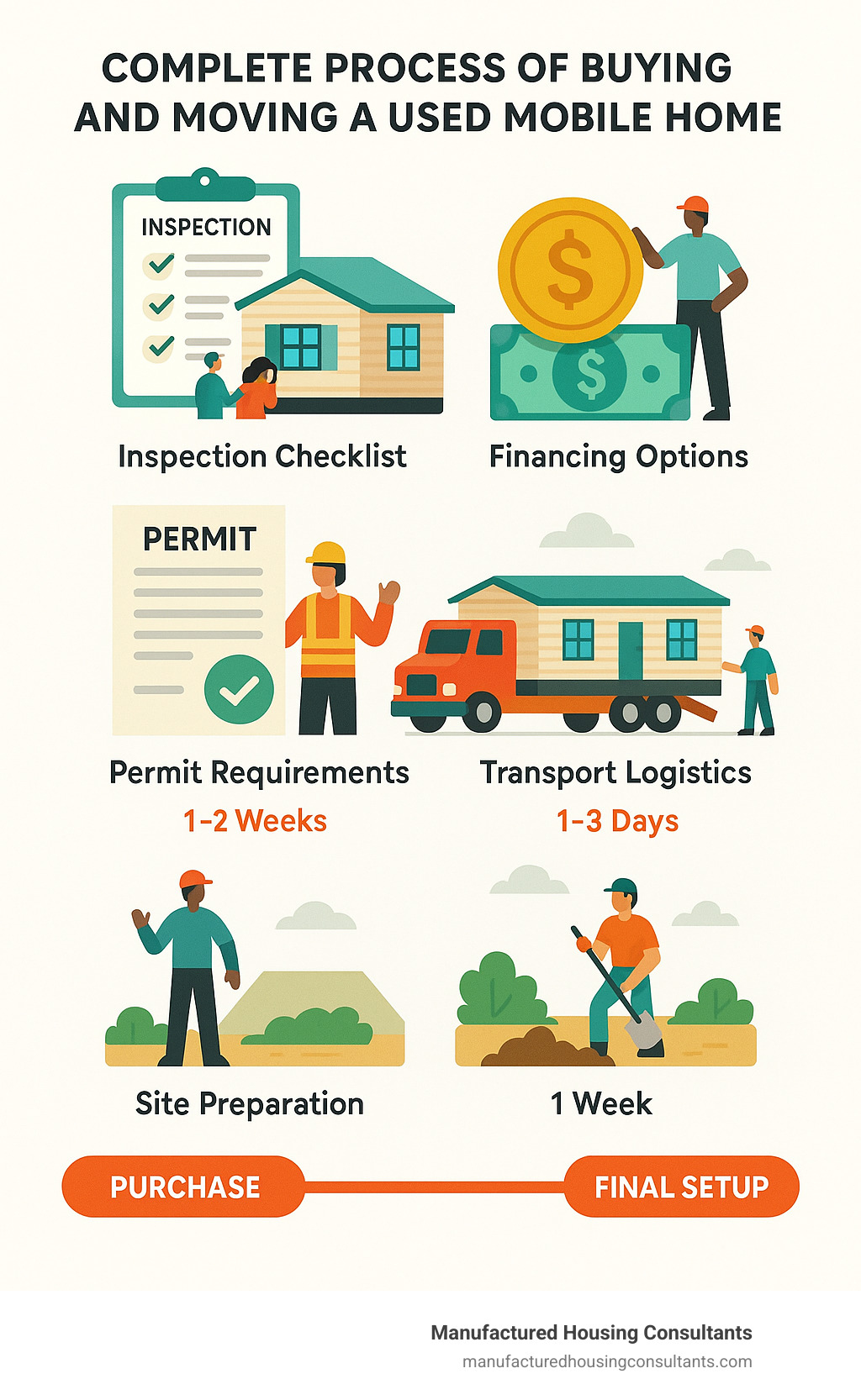
Used Mobile Home for Sale to Be Moved: Costs, Inspections & Financing
When you’re looking at a used mobile home for sale to be moved, the sticker price is just the beginning of your investment story. I like to tell my customers it’s a bit like buying a car – except this one needs a special truck, permits, and a foundation at the other end!
What Does “Used Mobile Home for Sale to Be Moved” Mean?
A used mobile home for sale to be moved is exactly what it sounds like – a pre-owned manufactured home that’s ready to hit the road to your location. These homes were built according to HUD standards (established back in 1976), which ensures they meet specific safety and construction requirements.
What makes these homes special is their permanent chassis with wheels. Think of it as your home having its own built-in transportation system! While the wheels might be removed during setup, they can be reattached when it’s time to relocate. Most manufactured homes stay put for decades, but that mobility option is always there – like having a secret superpower.
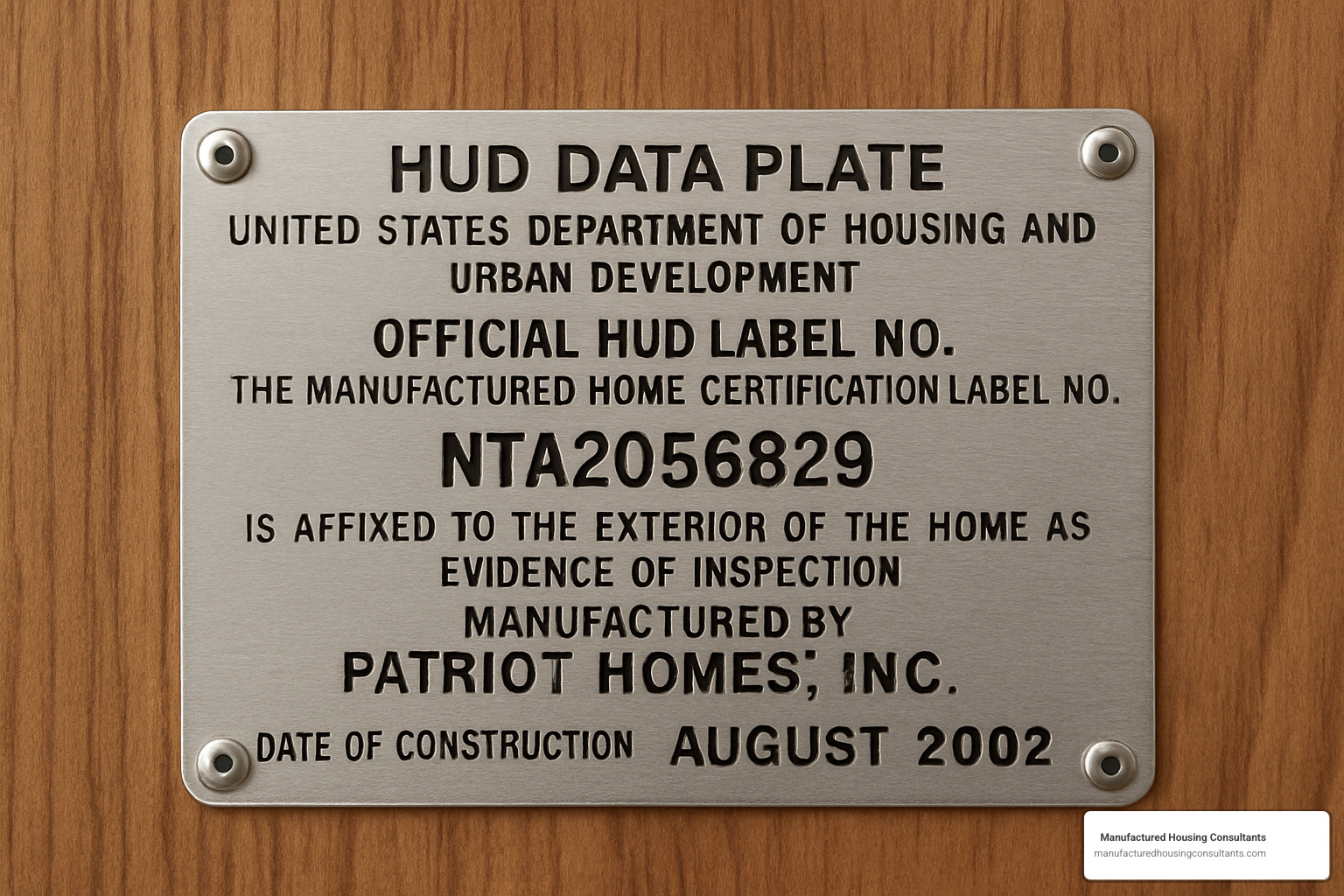
Why do these homes end up for sale with “to be moved” attached? There are several common scenarios we see:
Parks sometimes close or change ownership, forcing residents to relocate. Landowners might sell their property but not include the home in the deal. We also see folks upgrading to newer or larger homes who sell their current one for removal. Banks often sell repossessed homes with the condition they leave their current spot. And sadly, after someone passes away, their heirs might sell the mobile home separately from the land.
Here at Manufactured Housing Consultants, many of our clients have already purchased land and want an affordable housing solution they can place quickly. A used mobile home for sale to be moved fits the bill perfectly – providing immediate housing without waiting months for new construction.
Cost Breakdown: Purchase, Transport, Setup
Let’s talk dollars and cents. Your total investment breaks down into three main chunks:
First, there’s the purchase price. For a nice 3-bedroom, 2-bathroom single-wide, you’re typically looking at $25,000-$35,000 in Texas. Double-wides with similar features but more elbow room will run $35,000-$55,000.
Next comes transport fees. Basic transport runs about $5-$10 per mile, with higher rates for longer hauls. You’ll need escort vehicles ($1.50-$3 per mile) for those wide loads. Don’t forget permits ($100-$500 depending on your route) and disconnection costs at the original site ($1,000-$2,500). If you’re moving a double-wide, add another $1,000-$2,000 for breaking it down into transportable sections.
Finally, there’s setup expenses. Foundation preparation will cost $1,500-$4,000, while utility hookups (water, sewer, electric) add another $1,000-$3,000. Reassembling a double-wide? That’s $2,000-$4,000 more. Skirting installation ($500-$2,500), steps/porches ($500-$2,000), and final inspections ($200-$500) round out the essentials.
Here’s a real example from our San Antonio location that might help you visualize the total investment:
A 2012 double-wide with 3 bedrooms and 2 bathrooms was purchased for $32,000. We moved it 75 miles to the customer’s land near New Braunfels for $4,500 (including all permits and escorts). Setup with concrete runners, utility connections, skirting, and steps totaled $8,700. All in, the project cost $45,200 – significantly less than comparable site-built housing.
Watch out for some hidden costs that can catch folks by surprise: crane fees if your site has tricky access (especially for double-wides), tree removal or road improvements, temporary storage if your site isn’t ready, temporary housing during the transition, and repairs that might only become apparent during the move.
At Manufactured Housing Consultants, we pride ourselves on detailed quotes that include all these factors. Having delivered homes throughout Texas – from the coastal breezes of Corpus Christi to the border town of Laredo – we understand how costs and requirements vary across our great state.
Financing & Insurance Options for Mobile Homes to Be Moved
Contrary to popular belief, financing a used mobile home for sale to be moved is absolutely doable – and you have more options than you might think!
Home-only loans finance just the structure without land. These loans often have no age restrictions on the home (yes, even older models can qualify!), offer up to 100% loan-to-value for primary residences, and typically close in 4-6 weeks. Your down payment requirements will vary based on your credit, whether it’s your primary home, and the home’s condition.
If you’re buying land and a home together, land/home package loans combine everything into one neat financing package. These usually offer better interest rates than home-only loans, though they take a bit longer to close (6-8 weeks on average) and might have stricter credit requirements.
For smaller single-wides, personal loans offer a faster approval process, though they come with higher interest rates and shorter terms. And don’t overlook seller financing, which can be flexible and less dependent on traditional credit checks, though it often requires a larger down payment.

When it comes to insurance, lenders require full coverage homeowner’s insurance that lists them as loss payee, covers the current value of the home and improvements, and includes protection during transport. Even if you’re paying cash, we strongly recommend insurance that covers the move itself, the setup period, and standard homeowner’s coverage after placement.
Working with Manufactured Housing Consultants means we can connect you with lenders who understand the unique aspects of used mobile homes for sale to be moved. Many customers are pleasantly surprised to learn there are no age restrictions for financing, closing costs can often be rolled into the loan, seller concessions sometimes cover closing costs, and land can occasionally serve as a down payment if it’s owned free and clear.
For more details about financing options for bank-owned homes, check out our bank-owned manufactured homes for sale page.
Permits, Movers & Site Preparation
Getting your used mobile home for sale to be moved from point A to point B involves more than just hitching it to a truck and hitting the road. It’s a carefully orchestrated dance of paperwork, qualified professionals, and proper preparation. Let’s break down what you need to know to make this process smooth across the Lone Star State.
Permits and Legal Requirements Across Texas
When I help customers move homes across Texas, I always tell them that paperwork comes first – before any wheels start turning.
For starters, you’ll need to handle the title transfer properly. This means getting a clear title or lien release from the previous owner, completing the Application for Statement of Ownership (Form 1023), and paying the $55 filing fee to the Texas Department of Housing and Community Affairs. Think of this as officially becoming the home’s new “parent” – you’re adopting it, paperwork and all!
The transport itself requires TxDOT permits, which typically run $90-$120 depending on your home’s size. These aren’t optional – they’re absolutely required for all manufactured homes traveling Texas highways. These permits aren’t just pieces of paper; they’re your official route map, telling you exactly when and where you can travel (usually daylight hours only, with weekend and holiday restrictions).
Here’s something many buyers don’t realize: Texas has different Wind Zones, and they matter tremendously. You can move a home from a higher-rated zone to a lower one, but never the reverse. So a home built for coastal areas (Wind Zone III) can move inland, but not vice versa – it’s a one-way street when it comes to wind ratings.
Don’t forget about local requirements either! Each county has its own installation permits ($50-$200), zoning rules, and utility connection processes. Some areas have strict flood plain compliance requirements too. At Manufactured Housing Consultants, we handle all this paperwork for our customers, whether they’re in San Antonio, Victoria, or anywhere in between.
And those escort vehicles you see accompanying mobile homes on the highway? They’re not optional either. Single-wides typically need one escort, while double-wides require two (front and rear), complete with proper signage and lighting. Some counties even have additional escort requirements – it’s not just about following the rules, it’s about safety.
How to Vet Movers and Understand the Moving Process
Finding the right transport company for your used mobile home for sale to be moved is a bit like finding a good surgeon – you want someone with the right credentials, experience, and a steady hand.
Start by verifying they’re properly licensed and bonded with the Texas Department of Housing and Community Affairs. They should carry at least $1 million in liability insurance (yes, that much!) and have specific experience with your type of home. When we meet with potential movers at Manufactured Housing Consultants, we always ask for references and check reviews from previous customers.
Be wary of quotes that seem too good to be true – they usually are. A suspiciously low price often means corners will be cut somewhere along the line. Also, run the other way if a mover won’t provide proof of insurance, wants a large deposit upfront, or can’t clearly explain the permit process. These are all red flags waving in the Texas wind!
The actual moving process typically unfolds over about a week:
First comes the pre-move inspection, where the mover examines your home’s condition, identifies any structural concerns, and confirms the route is accessible. This usually happens 1-2 days before the move.
Next is disconnection day, when utilities are safely disconnected, the home is detached from its foundation, and exterior attachments like skirting are removed. If you have a double-wide, this is when the sections are separated at the marriage line.
The same day, the home gets prepared for travel – windows and doors secured, loose items inside either secured or removed, and the axles, wheels, and towing hitch attached or checked.
Transport day usually starts early in the morning. The home travels at reduced speeds (never more than 45-55 mph), with frequent stops to check that everything remains secure. Those escort vehicles earn their keep by maintaining a safety buffer around your precious cargo.
Finally, setup takes 1-3 days depending on your home’s size. This includes placement on the prepared foundation, leveling and anchoring, reconnecting sections for double-wides, hooking up utilities, and completing final inspections.
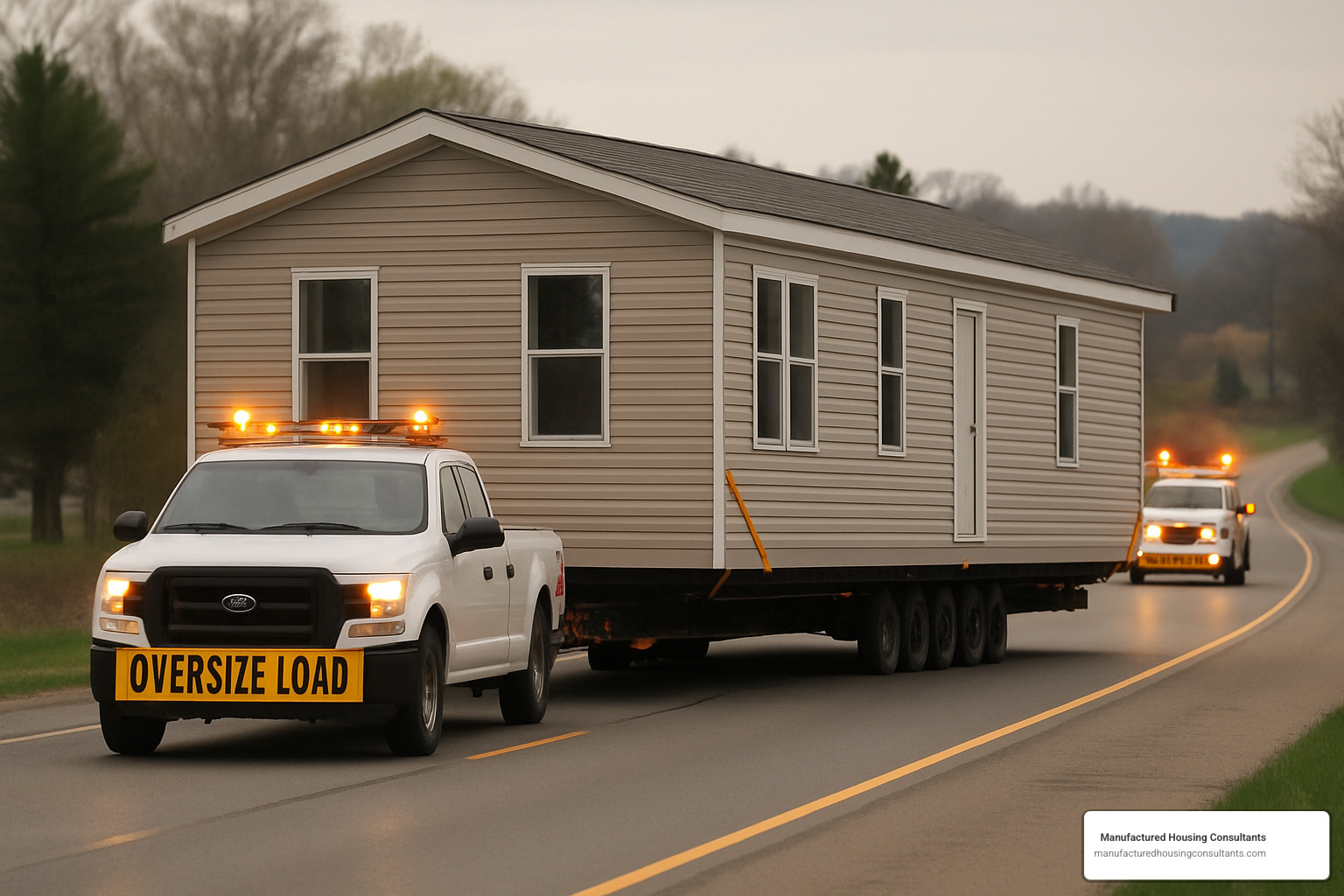
Mistakes to Avoid When Buying a Used Mobile Home for Sale to Be Moved
After helping countless folks move homes across Texas, I’ve seen the same mistakes pop up time and again. Let me share them so you can avoid these common pitfalls.
Skipping the frame inspection is like buying a car without checking the engine. The frame is your home’s backbone, and damage can make transport dangerous or impossible. Look closely for rust or corrosion (especially at connection points), bends or cracks, missing cross-members, and any DIY modifications that might compromise integrity.
Many buyers focus solely on the purchase price, underestimating the total costs involved. Remember to factor in disconnect fees at the current location, transport costs (including those permits and escorts we talked about), site preparation, setup and utility connections, and potential repairs finded during the move. A $25,000 home can easily become a $35,000 project when all is said and done.
Before you fall in love with a home, confirm the transport route is feasible. Can the home physically exit its current location? Are there low bridges, tight turns, or weight-restricted roads along the way? Can you get all the necessary permits for your planned route? I once had a customer who bought a beautiful double-wide without checking these details, only to find a low bridge made the direct route impossible – adding 67 miles and $2,000 to the move!
If you’re moving to a mobile home park, ignoring park rules and requirements can lead to heartbreak. Always confirm the park accepts homes of your age and size, review all setup and appearance requirements, and get written approval before purchasing. I’ve seen too many folks buy a home only to find their intended park won’t accept it.
Insurance during transport often falls through the cracks. Your regular homeowner’s policy likely won’t cover the move itself – you’ll need special transit coverage, plus coverage during setup, before transitioning to standard homeowner’s insurance after placement.
Always, always get everything in writing – purchase agreements with inspection contingencies, transport contracts with detailed scope of work, setup specifications and warranties, and copies of all permits and approvals. Handshake deals might be the Texas way, but paperwork is your protection.
Lastly, don’t rush the process. Allow time for multiple inspections, permit processing (which can take 2-3 weeks in some areas), proper site preparation, scheduling qualified movers (who are often booked weeks ahead), and inevitable weather delays. This isn’t a process to hurry through.
At Manufactured Housing Consultants, we’ve guided customers through these potential pitfalls from San Antonio to New Braunfels, Laredo, and beyond. Our experience ensures your journey to affordable homeownership stays on the right path – without any unexpected detours.
For scientific research and more details on Texas manufactured housing regulations, the Texas Department of Housing and Community Affairs provides comprehensive resources that can supplement your knowledge as you steer this process.
Finding Listings, Evaluating Deals & Preparing the New Site
Looking for a used mobile home for sale to be moved can feel like searching for a needle in a haystack if you don’t know where to look. But don’t worry – with a little insider knowledge, you can find great deals and ensure your new land is perfectly prepped for delivery day.
Best Places to Search for Ready-to-Move Homes
When our customers ask where to find quality used mobile homes for sale to be moved, I always share these treasure troves that most folks overlook:
Facebook Marketplace has become a goldmine for mobile home listings – just filter by “mobile/manufactured” under the housing section. Many sellers post here first because it’s free and reaches a local audience quickly. Craigslist remains valuable too, but don’t just check “mobile homes for sale” – the “housing wanted” section often has people looking to have homes removed from their property at bargain prices.
Specialized websites like MHVillage can be helpful, but some of our best deals come through word of mouth. Tell everyone you know that you’re looking – your hairdresser’s cousin might have exactly what you need sitting on land they’re about to develop!
Bank repossessions offer exceptional value if you’re willing to do a bit more legwork. These homes are typically priced to move quickly, and while they might need some TLC, the savings can be substantial. You can find these on lender websites or through auction platforms like Hudson & Marshall.
Don’t overlook mobile home parks experiencing changes. When parks undergo ownership changes or face closure, residents often need to sell quickly. A friendly conversation with park managers can uncover opportunities before they’re publicly listed. We’ve helped many customers find incredible deals this way throughout San Antonio and beyond.
Estate sales represent another often-overlooked source. These situations typically involve well-maintained homes with motivated sellers. Check local probate court listings or connect with estate sale companies in your area.
At Manufactured Housing Consultants, we maintain an inventory of quality pre-owned homes ready for transport. When you work with an established dealer like us, you get peace of mind knowing the home has been pre-screened for structural integrity, comes with a guaranteed clear title, and can include transport and setup services.
Essential Inspection Checklist Before You Commit
Before saying “yes” to any used mobile home for sale to be moved, a thorough inspection is absolutely critical. I’ve seen too many people skip this step only to face expensive surprises later.
Start with the frame – it’s literally the backbone of your mobile home. Look for rust, bends, or previous repairs. If the frame is compromised, the home may not survive the journey to your property. Run your hand along the I-beams and check for any deformation or excessive rust at connection points.
The floor tells many secrets about a home’s history. Walk every square inch, feeling for soft spots or bounce. Pay special attention to areas around toilets, showers, and exterior doors where water damage commonly occurs. A slightly springy floor might be fixable, but significant softness usually indicates subfloor damage that can be expensive to repair.
Roof integrity is non-negotiable. Water is a mobile home’s worst enemy, so inspect for stains on ceilings and walls that indicate past or current leaks. A roof-over might look nice but could be hiding serious problems underneath.
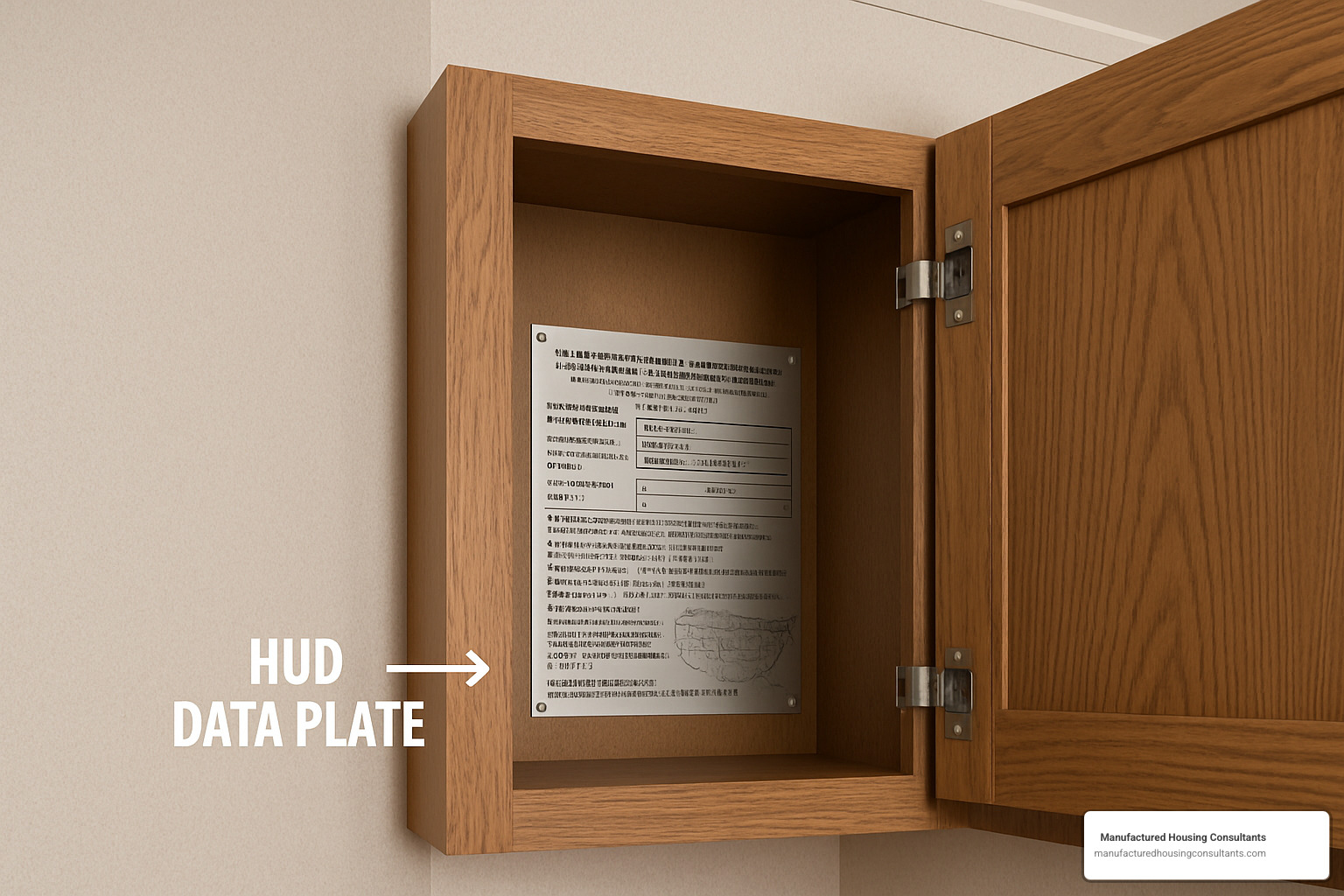
Always locate the HUD data plate (typically hidden in the master bedroom closet or inside a kitchen cabinet). This small metal plate confirms the home was built after June 15, 1976, when federal construction standards were implemented. It also tells you the Wind Zone rating, which must match your destination area – this isn’t just a recommendation, it’s a legal requirement in Texas.
Test all systems thoroughly. Run water through every pipe, flip every switch, and test every outlet. Mobile homes have integrated systems, and what looks like a simple electrical issue might actually indicate a more significant problem.
For homes that will be moved, pay special attention to moving-specific components. Are the axles and wheels present or available? Is the tongue/hitch in good condition? Is the belly wrap intact to protect during transport? These elements are crucial for a successful move.
At Manufactured Housing Consultants, we perform these detailed inspections on every home we sell. For homes purchased elsewhere, we offer professional inspection services to ensure your investment is sound before you commit to transport.
Preparing Your Land for Delivery Day
The excitement of finding the perfect used mobile home for sale to be moved can quickly turn to stress if your land isn’t properly prepared for delivery day. Here’s how to ensure a smooth arrival:
Start with thoughtful site planning. Mark your property boundaries and determine exactly where your home will sit, considering setbacks from property lines (check local zoning), natural drainage patterns, and even views from your future windows. This planning stage is the time to visualize pathways, gardens, and additional structures you might want in the future.
Access preparation is often overlooked until it’s too late. Your delivery team needs at least 14 feet of clearance for single-wides and 28 feet for double-wides. Walk the entire route from the main road to your planned home site, looking for obstacles like low-hanging branches, narrow gates, or soft ground that could bog down heavy equipment. Delivery trucks need space to turn around after placement.
Your foundation preparation will depend on local code requirements, soil conditions, and budget. Most of our Texas customers opt for concrete runners – they’re cost-effective and perform well in our soil conditions. Whatever foundation type you choose, ensure the site is properly cleared and leveled, with all vegetation and organic material removed to prevent settling issues later.
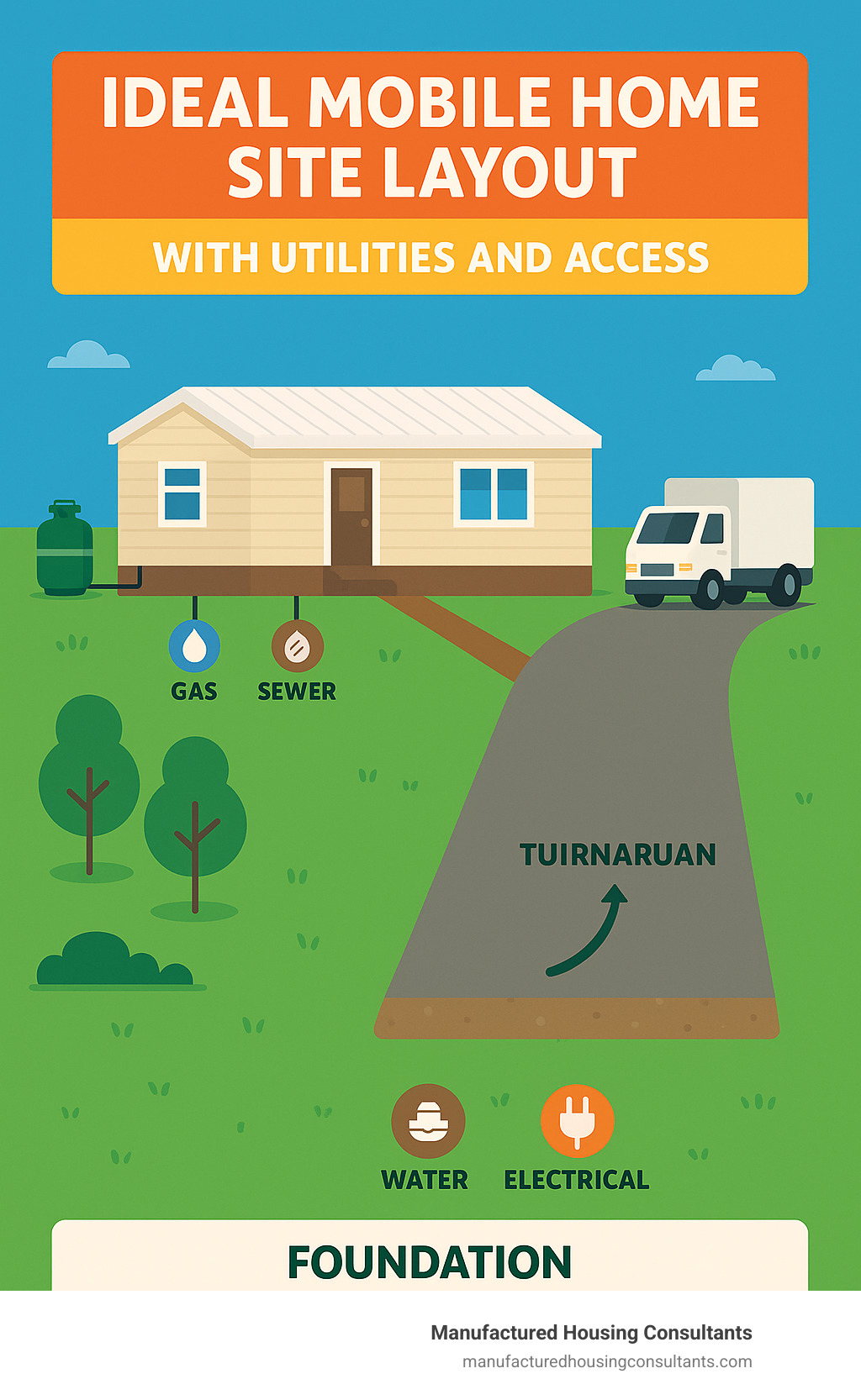
Utility preparation should begin well before delivery day. Extend water lines to the home site, arrange for electrical service (both temporary power for setup and permanent connections), and plan for sewer or septic connections. In rural Texas properties, we often help customers coordinate propane tank placement as well.
Drainage considerations are particularly important in areas like San Antonio and New Braunfels, where sudden downpours can create water issues. Grade the site to direct water away from where your home will sit, and consider additional measures like French drains if your property has poor natural drainage.
The day before delivery, run through a final checklist: Is the site dry and firm enough for heavy equipment? Are all obstacles removed? Have you informed your neighbors about the delivery timing? These small courtesies can make delivery day much smoother.
At Manufactured Housing Consultants, we offer site assessment services throughout Texas. Our team can identify potential issues before they become problems and connect you with reliable contractors for site preparation. For customers who prefer a turnkey solution, we coordinate the entire process from site prep through final setup, ensuring every detail is handled professionally.
For more information about finding quality used repo homes, visit our page on finding used repo mobile homes for sale near me.
Conclusion
When you’re on the hunt for a used mobile home for sale to be moved, the journey involves several important steps – from careful research and inspection to planning for transport and setup. Though this process might seem complex, the payoff is significant: affordable housing that you can place on your own land or in a welcoming community.
Here at Manufactured Housing Consultants, we’ve walked alongside thousands of Texas families through every stage of finding, purchasing, moving, and setting up quality manufactured homes. Our hands-on experience covers the entire process, supporting you from your initial search all the way to that final inspection after your home is placed.
What have we learned along the way? A few critical points stand out:
First, always look beyond the sticker price. The purchase amount is just the starting point – you’ll need to factor in transport costs, setup fees, site preparation expenses, and any potential repairs that might arise. Being prepared for these additional costs prevents unwelcome surprises down the road.
The condition of your potential home deserves your closest attention. Pay special attention to the frame, roof, floors, and major systems, particularly since the home will experience the stress of being moved. A thorough inspection now saves headaches later.
Don’t assume financing will be difficult. Many people are surprised to learn that numerous lenders offer home-only loans with no age restrictions and up to 100% LTV for primary residences. Your dream of affordable homeownership might be more accessible than you think.
Legal requirements can’t be overlooked. Title transfers, transport permits, and local setup approvals are all essential parts of the process. Having these documents in order ensures smooth sailing through each stage.
The people moving your home matter tremendously. Licensed, insured professionals with specific manufactured home experience might cost more upfront, but their expertise protects your investment during the crucial transport phase.
Site preparation makes all the difference in how smoothly delivery day goes. Adequate access, proper foundation work, and well-planned utility connections create the conditions for a successful delivery and setup.
Finally, protect what you’ve worked so hard to acquire. Appropriate insurance coverage during transport, setup, and occupancy isn’t just a good idea – it’s absolutely necessary.
Whether you’ve got your heart set on a cozy single-wide or you need the spacious comfort of a double-wide for your growing family, a used mobile home for sale to be moved offers exceptional value. With thoughtful research and professional guidance, you can steer this process successfully and enjoy your affordable housing solution for years to come.
Ready for personalized help with finding, financing, moving, or setting up a used mobile home anywhere in Texas? Our team at Manufactured Housing Consultants is here to assist. With locations across the state – from San Antonio to New Braunfels, Laredo to Corpus Christi, Victoria to Von Ormy – we’re ready to support your mobile home journey every step of the way.
For a look at our current selection of quality double-wide homes, visit our double-wide mobile homes page and find the perfect match for your needs and budget.

